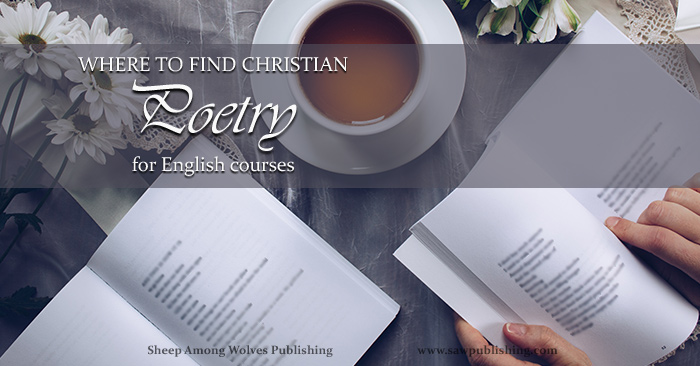How Do You Recognize Good and Great Poetry?
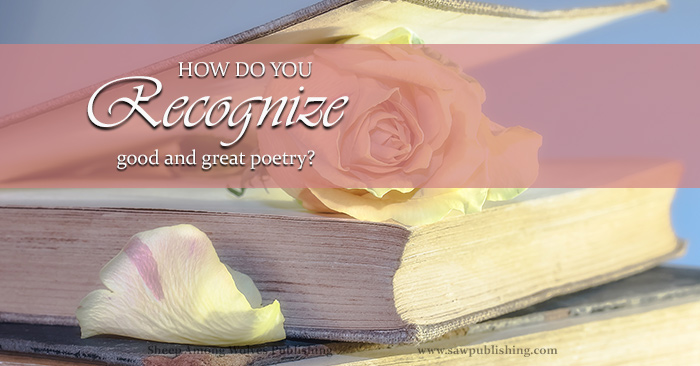 How do you recognize good and great poetry?
How do you recognize good and great poetry?
August is the time of year for asking educational questions in North America. Depending on which state/province you live in, this month will either find you rushing through final details and curriculum choices for the coming homeschool year, or plunged into the fine-tuned decision making of the first few weeks of back-to-school.
Supplementary reading, including non-fiction, novels, and poetry, tends to end up in this last-minute category. You’ve got most of the big choices made for your coming English, history, and social studies courses—now you’ve got to fill in the blanks, and decide exactly what pieces of literature you’re going to put into your student’s hands.
Filling Your Homeschool with Good and Great Books
SAW Publishing strongly advocates the power of good and great literature. Over the past few months we’ve taken a look at some attributes of good books—writings characterized by high spiritual values and innocence of evil—as well as some attributes of great books—ones exemplifying high literary merit.
These posts were directed primarily at prose, but a well-rounded school curriculum includes good and great poetry as well. So how do you recognize good and great poetry?
Today we’ll take a look at three checkpoints which embody the essence of good and great poetry, and provide an easy starting place for choosing poems that will be a blessing to your homeschool.
1) Good and Great Poetry Is Structurally Sound
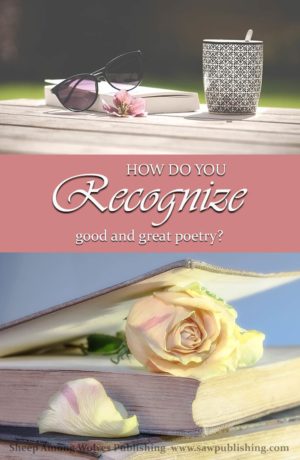 Outstanding poetry presents accurate rhymes and consistent metre. This fact is foundational to an ability to recognize good and great poetry.
Outstanding poetry presents accurate rhymes and consistent metre. This fact is foundational to an ability to recognize good and great poetry.
In making such a statement, we are not necessarily excluding styles such as blank verse (which contains no rhyme) or free verse (which contains no metre.) These forms of poetry omit, rather than stretch, certain structural rules. But where rhyme is used, it should be true; and where metre is used, it should be correct.
Admittedly, some of the most skillful poets are able to break these “laws” of writing, but it takes genius to be able to do so without damage to the poem. Giving your students a natural sense of rhyme and meter is worth the effort.
Keep the structural accuracy of a poem in mind, when you are evaluating whether you’d like to incorporate into your curriculum. The more familiar a student becomes with sound rhyme and meter, the more naturally, subconsciously, and intuitively they will recognize the structural elements of good and great poetry.
2) Good and Great Poetry Presents an Original Slant
Of course, to consistently recognize good and great poetry, we have to consider far more than a poem’s structural merits. This is where the concept of evaluating poetry can become blurry, because originality, even when embodied in flawed rhyme or meter, will often assert its real value over correctly constructed but unremarkable verses. Contrast the following examples – both written by gifted poets whose works have become universal classics:
When I was down beside the sea
A wooden spade they gave to me
To dig the sandy shore.
My holes were empty like a cup.
In every hole the sea came up,
Till it could come no more.
– Robert Louis Stevenson (1850-1894)
This poem gives us a pleasant little sketch of a childhood visit to the ocean, expressed in faultless rhyme and meter. In this sense it is a great poem. Note however that it treats a more or less commonplace idea in a more or less commonplace way.
The one setting where it might have the effect of originality, would be when read to a small child, who is new to the phenomenon of the ocean filling holes dug in the sand. In that case, the idea would come as something fresh and new to the child, even though the poem does not really present an original slant from an adult’s perspective.
Another Ocean Poem
Now contrast Stevenson’s picture of the ocean and the tide with another:
Sunset and evening star,
And one clear call for me!
And may there be no moaning of the bar
When I put out to sea.
But such a tide as moving seems asleep,
Too full for sound and foam.
When that which drew from the boundless deep
Turns again home.
Twilight and evening bell,
And after that the dark!
And may there be no sadness of farewell
When I embark.
For, though from out our bourne of time and place
The flood may bear me far,
I hope to see my Pilot face to face
When I have crossed the bar.
– Alfred Tennyson (1809-1892)
Admittedly, the meter is rank anarchy in places. I find it comical that in looking at this poem in a hymnal, I found that numerous lines had been (naturally enough) reworked to make it fit with a tune.
Nevertheless, there is a gripping strength to the piece. It is indisputable that Tennyson’s powerful idea, expressed in equally powerful language, is far more of a good and great poem than Stevenson’s, despite the faultless structure of the latter.
3) Good and Great Poetry Fosters Growth
Hand in hand with the idea of original thoughts comes the concept of growth-provoking thoughts. The very greatest and best poems spark something more than mere admiration in the heart that reads them. At the end of the day, good and great poems give us ideas that make us grow into good and great Christians.
This is the second element of power in “Crossing The Bar.” We all know that sooner or later each one of us will have to face our sunset and the “one clear call” that Tennyson describes. Deep down, we all long to be able to face that call with the calmness and peace the author depicts. And as Christians, we feel a resonance in the reminder that death is, after all, only a trial to be passed through – and that we may see our Saviour “face to face, when we have crossed the bar.”
It is this combination of challenge and resonance on a spiritual level which adds the final ingredient to an outstanding poem. It provides the last link in your quest to recognize good and great poetry.
So What Makes A Poem Good and Great?
The evaluation of poetry, like the evaluation of all other arts, is largely qualitative. Much as we might like, in the midst of our back-to-school rat-race, to find a mathematical formula that would evaluate good and great poetry with a fast-working equation, such a formula really doesn’t exist.
But when you look carefully at a poem, zeroing in on its structural components, its originality of thought, and its impact on personal growth, you will be able to recognize with increasing accuracy the traits that decide whether it is good and great—whether it is the kind of poem that will be a blessing in your homeschooling curriculum.
If you are looking for some specific sources of good and great poems, see our previous post:
You might also enjoy:
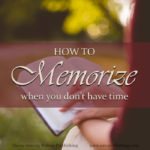
Would you like to memorize poetry, but just can’t find the time? Today’s Timeless Tip from Homemakers of the Past offers a valuable secret for making the most of the minutes you already have.
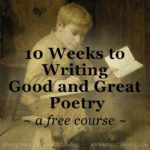
Are you looking for a Christian course that will teach your high school student to write poetry? Check out our FREE 10 Weeks to Writing Good and Great Poetry.

What do I do if my student hates reading? There may be no perfect recipe for getting your child to love reading. But there is a way to make sure they love great books!

